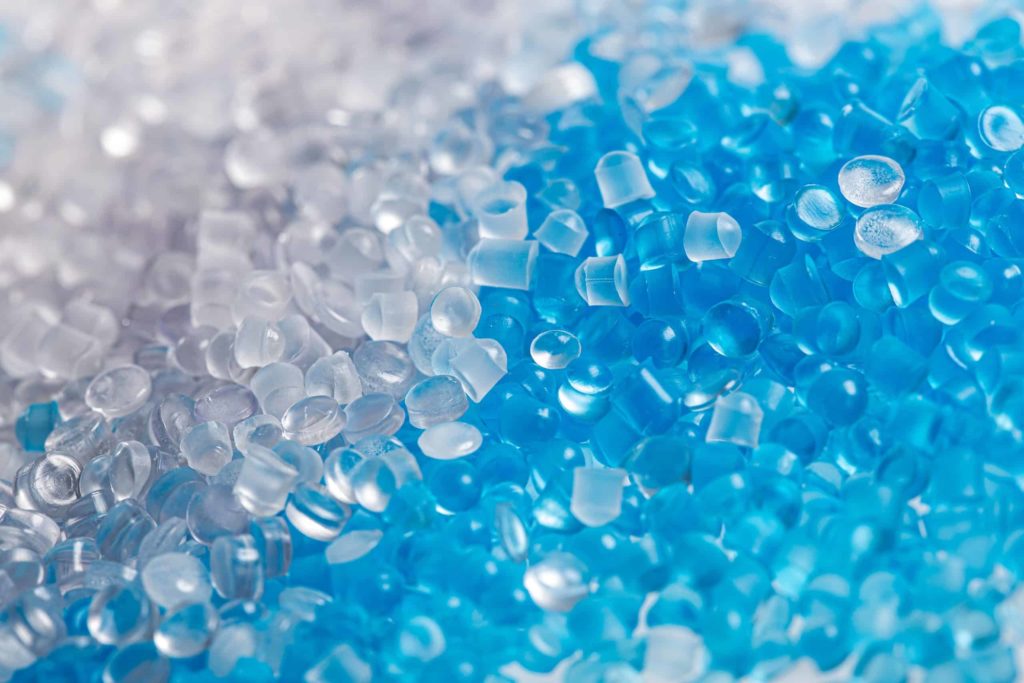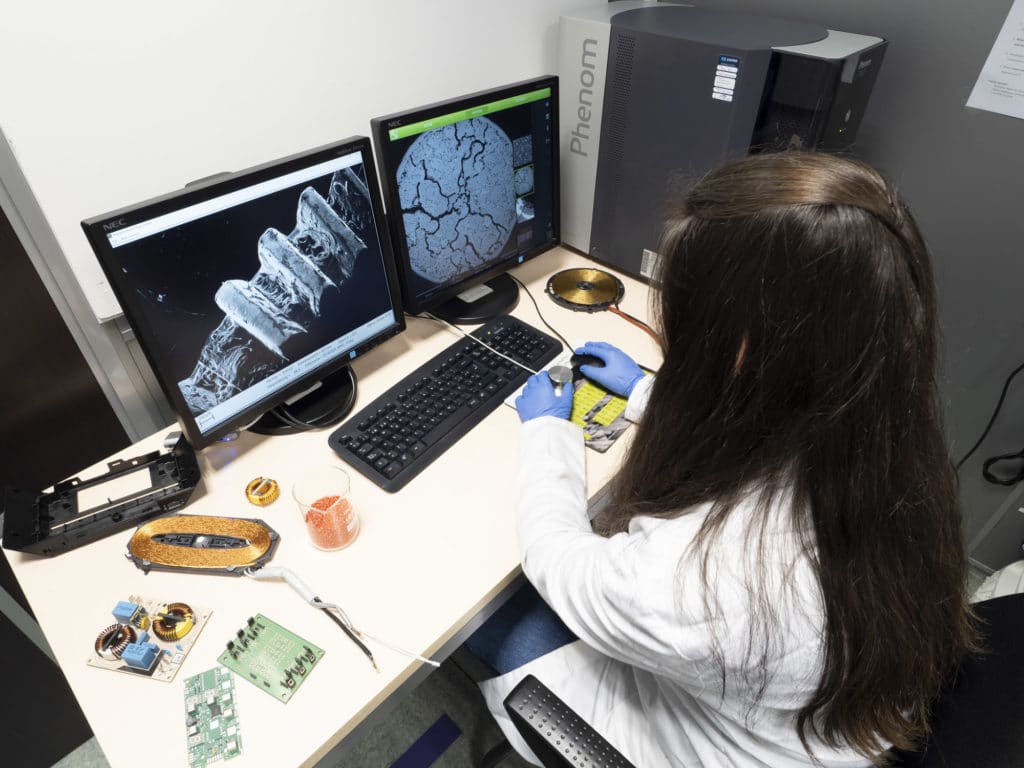Characterization of materials
Material characterisation is a key process in industry to guarantee the quality, functionality and reliability of products throughout their entire life cycle.
At INFINITIA Industrial Consulting, we offer a comprehensive material characterisation service aimed at accurately determining the physical, chemical and mechanical behaviour of any substance or component. This knowledge is essential for making strategic decisions in the design, development, manufacturing and validation of industrial products.
At INFINITIA’s industrial laboratory, we have a team of materials specialists and state-of-the-art technology to carry out these analyses with the utmost accuracy and technical rigour.
What is materials characterization?
Material characterisation consists of studying the structural, morphological and functional properties of a substance in order to determine its composition, resistance, durability, behaviour under external stresses and possible industrial applications.
Using advanced techniques such as spectroscopy, microscopy, thermal analysis, and mechanical and corrosion testing, at INFINITIA we analyse metallic, polymer, ceramic, composite and coating materials. This in-depth analysis allows us to establish relationships between the internal structure of the material and its performance under real conditions of use, anticipating its behaviour and reliability.

Benefits of material characterisation
One of the great benefits of material characterisation is its ability to optimise the production process from its earliest stages. At INFINITIA, we help our clients select the best raw materials, validate suppliers, prevent possible failures due to fatigue or corrosion, improve design efficiency and extend product life.
For example, through thermal and mechanical testing, we have optimised plastic formulations to achieve more resistant materials and selected suitable metal alloys for components exposed to aggressive environments.
These types of decisions based on objective data have a direct impact on the competitiveness of the final product.
Material characterisation at INFINITIA
At INFINITIA, we approach each material characterisation project from a multidisciplinary perspective, combining expertise in forensic engineering, materials science and industry-specific technical regulations.
Our laboratory is equipped with state-of-the-art equipment to perform everything from destructive testing to non-destructive testing, covering all phases of analysis, including sample preparation.
Whether it is the characterisation of plastics, metals, composites or innovative materials, at INFINITIA we offer a technical and advisory service tailored to the specific requirements of each client and each industrial application.

Types of Material Characterisation Tests
At INFINITIA, we develop different characterisation tests to evaluate the physical-chemical, thermal, mechanical and structural properties of materials used in industrial products. Our goal is to accurately understand the behaviour of each material, optimising its application, functionality and useful life.
Chemical composition and structure tests
These tests identify the elements and compounds present in a sample and how they are organised at the molecular level. Techniques such as infrared spectroscopy (FTIR), atomic absorption spectroscopy (AAS), X-ray fluorescence (XRF) and nuclear magnetic resonance (NMR) are used.
These tests are key to verifying the composition of raw materials, identifying cross-contamination and validating the purity of compounds. For example, at INFINITIA we have used FTIR to identify unknown additives in technical polymers intended for automotive parts.
Microscopy and morphological analysis tests
Microscopy tests allow us to observe the microstructures of materials, detect surface defects and analyse the internal phases of metals, ceramics or composites.
We use optical microscopy, scanning electron microscopy (SEM) and atomic force microscopy (AFM) to generate detailed images. For example, in a project for the electronics industry, microcracks in critical welds were identified using SEM, optimising production parameters to reduce failures.
These tests allow us to evaluate the behaviour of materials under stress such as traction, compression, torsion or fatigue. At INFINITIA, we carry out hardness, elastic modulus and impact resistance tests in accordance with international standards (ISO, ASTM).
A common example is the validation of the resistance of plastic casings for certain components, where we carry out drop and impact tests to determine their durability under real conditions of use.
Thermal analyses determine how a material behaves when exposed to temperature variations. We use techniques such as DSC and TGA to analyse glass transitions, thermal stability and mass loss.
For example, when developing a new insulation material, we apply differential calorimetry to ensure that the polymer maintains its properties during operating conditions.
These tests simulate extreme conditions to predict the durability of the material against corrosion, humidity or ageing. We apply methods such as salt spray, climatic chambers, electrochemical tests and different accelerated tests to reproduce years of operating conditions in a matter of weeks.
In one case for components, several metal coatings were compared by subjecting them to salt spray for 500 hours to select the best alternative in terms of oxidation resistance.
Gas chromatography (GC) and liquid chromatography (HPLC) are used to analyse residues, migrations and volatile compounds. These tests are essential for materials in contact with food or in medical devices.
At INFINITIA, we have used HPLC to measure the migration of plasticisers in food packaging films, enabling us to validate compliance with European legislation (EU 10/2011).
Applications of Material Characterisation
Material characterisation has fundamental applications in many industrial sectors. Through physical, chemical, thermal and mechanical testing, at INFINITIA we help to validate products, select raw materials and anticipate possible failures in real-life conditions. Below are some of the sectors where this service is key.
Automotive industry
In the automotive industry, materials must withstand vibrations, mechanical loads and extreme weather conditions. Characterisation allows us to select lightweight, resistant and durable solutions for structural components, plastic housings, metal coatings and parts subject to fatigue.
- Validation of plastic housings subjected to thermal cycles and impacts to ensure their integrity during prolonged use.
- Comparison of metal coatings using salt spray tests, selecting the most corrosion resistant option.
- Evaluation of mechanical fatigue in structural parts using cyclic tensile and flexural tests.
Food Industry and Packaging
The materials used in packaging must guarantee food safety and preserve the properties of the product. Characterisation allows the thermal resistance, barrier behaviour and possible migration of substances to be validated, in compliance with European and sectoral regulations.
- Migration tests of plasticisers in food packaging using chromatography (HPLC and GC).
- Thermal analysis of films to validate their resistance to pasteurisation processes.
- Measurement of barrier properties against moisture and oxygen to improve food preservation.
Medical Devices
Medical materials must withstand sterilisation processes, maintain dimensional stability and not release toxic compounds. Characterisation ensures the safety, functionality and service life of polymers, coatings and implantable or disposable parts.
- Thermal studies to verify the stability of polymers after steam or gas sterilisation.
- Structural characterisation of polymers used in temporary implants using microscopy and mechanical analysis.
- Detection of chemical residues in devices using liquid chromatography.
Energy and Electronics Sector
In electronic and energy systems, materials must offer thermal stability, dielectric strength and predictable behaviour under load cycles. Characterisation ensures their reliability in encapsulants, insulators and components for power electronics or electric mobility.
- Analysis of ceramics used in batteries and power systems.
- Thermal evaluation of encapsulants for electronic circuits using DSC and TGA.
- Quality control of epoxy resins applied in converters and transformers.
Construction Industry
Construction materials must maintain their structural integrity in the face of moisture, loads, abrasion and chemical agents. Characterisation allows their long-term behaviour to be anticipated and solutions to be validated in accordance with technical regulations and environmental requirements.
- Compression tests on reinforced concrete in accordance with technical regulations.
- Accelerated ageing tests on facade panels to evaluate their response to moisture and UV radiation.
- Measurement of surface wear on industrial flooring using mechanical tests.
Technical Textiles and Functionalised Materials
Technical textiles and functionalised surfaces must maintain properties such as fire resistance, antimicrobial effect or thermal comfort. At INFINITIA, we characterise these materials to validate their effectiveness and durability under real conditions of use.
- Tear and fire resistance tests on technical fabrics used in workwear and transport.
- Analysis of antimicrobial coatings applied to textiles using electron microscopy.
- Thermal studies of fabrics with temperature-regulating properties to improve thermal comfort.
Why choose INFINITIA for material characterisation
Material characterisation is an essential tool for ensuring the reliability, functionality and efficiency of industrial products in highly demanding sectors. It provides in-depth knowledge of the physical-chemical, mechanical and thermal properties of materials, detects defects, validates suppliers and anticipates possible failure modes.
From the selection of raw materials to the improvement of manufacturing processes, characterisation tests provide objective data that reduce technical uncertainty and facilitate strategic decisions in product development.

At INFINITIA, we combine state-of-the-art equipment, specialised personnel and scientific methodologies tailored to each case. Our multidisciplinary approach allows us to tackle complex projects with rigour, whether to validate new materials, solve quality problems or adapt components to specific regulations. We work with both large manufacturers and industrial SMEs, providing customised technical solutions that have a direct impact on our clients’ competitiveness.
Material characterisation is also evolving: non-destructive techniques and the combined use of advanced tools such as electron microscopy are opening up new possibilities in materials innovation.
Counting on INFINITIA for this type of analysis means having access to an industrial laboratory with a forward-looking vision and a commitment to technical excellence.


